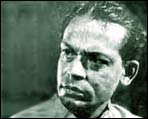
![]() Festivals
Festivals
![]() Durga Puja
Durga Puja
![]() Associations
Associations
![]() Learn
Bangla
Learn
Bangla
![]() Beng.
Marriage
Beng.
Marriage
![]() Art &
Craft
Art &
Craft
![]() Great Indians
Great Indians
![]() Beauty
Care
Beauty
Care
![]() Recipe
Recipe
![]() Astrology
Astrology
![]() Beng.
Section
Beng.
Section
![]() Bengal
Bengal
![]() Calcutta
Calcutta
![]() Beng.
Calendar
Beng.
Calendar
![]() Wallpapers
Wallpapers
![]() Movie
Movie
![]() Music
Music
![]() E-Card
E-Card
![]() Shopping
Shopping
![]() E-Puja Room
E-Puja Room
![]() News
News
![]() E-mail
E-mail
![]() Month's Events
Month's Events
![]() Weather
Weather
![]() Chat
Chat
![]() Education
Education
![]() Join Us
Join Us
![]() Advertise
Advertise
![]() Website links
Website links
![]() Link to us
Link to us
![]() Guest Corner
Guest Corner
![]() Services
Services
![]() WebSite
Design
WebSite
Design

Ritwik was one of the few truly original talents in the cinema this country has produced. A creator of powerful images in an epic style he was virtually unsurpassed in Indian cinema. Accordingly, it was the massive size of the film going audience, rather than a love for the cinema, that Ghatak claims brought him to the business of films.
Ghatak was born on 4 November, 1925, at Jindabazar, Dhaka, the cultural centre of East Bengal (now Bangladesh), which had become, by the beginning of his filmmaking career, East Pakistan. At that time, Pakistan had a general ban on all Indian films. As a consequence, for the majority of Ghatak's filmmaking career, his films could not screen in his birth city. Ghatak joined the left-wing Indian People's Theatre Association (IPTA) where he worked for a few years as a playwright, actor and director. When IPTA split into factions, Ghatak turned to filmmaking . Ghatak migrated to Calcutta in early youth, attending the M.A. class at Calcutta University in 1948. His films are heavily influenced by his personal experience of Partition.
Ghatak's work in the cinema itself never settled into any one genre of style. Ghatak discusses this capacity for assimilation common to "children, simple folk like peasants, animists like tribals", he acknowledges the trends of the modern era: "The order of the day is an emotional integration with this machine age". Ghatak, an innovative filmmaker, breaking and creating all kinds of cinematic rules and regulations, does not hide behind a medieval or a dead past or a decorative Indianess, Ghatak's films are always challenging. They never make one feel comfortable. - the experience of exile - to folk and epic forms which together expand into an investigation of film form. These are the key elements of Ghatak's originality in the cinema - a potent mix.
Nagarik (The Citizen), the first film Ghatak ever made, was completed in 1953 but in fact released posthumously in 1977. The central character of Nagarik, Ramu, opens the film looking for a job in Calcutta, while his family struggles to make ends meet.
Ajantrik, (Pathetic Fallacy or The Unmechanical, 1958) was set in Bihar
around the activities of a taxi driver who lives at a bus station, it
was Ghatak's first film to be released commercially.
Meghey Dhaka Tara (The Cloud-Capped Star, 1960), Kormal Gandhar (The Gandhar Sublime, 1961) and Subarnarekha (The Golden Line, 1962) form a trilogy around the socio-economic implications of Partition. Ghatak's own description of a moment in his film Subarnarekha (which, like Komal Gandhar, was an absolute box officer failure) set in a refugee colony, called Nabajeeban on the outskirts of Calcutta in the 1950s, illustrates beautifully his cinematic manifestation of Partition.
GREAT INDIANS || BENGALI SECTION || BENGALI MARRIAGE || WALLPAPER || BENGAL || WEATHER || E-CARD
MOVIE || WEBSITE LINKS || ASSOCIATIONS || SHOPPING || ASTROLOGY || MUSIC || BEAUTY CARE || NEWS
GUEST CORNER || FEEDBACK ||LINK TO US || FOR ADVERTISING || SERVICES || CONTACT || EDUCATION || JOIN US
Graphics, Sound or content copied or produced in part or whole in any media will be illegal.
Persons or websites caught using our material will be penalized.
Privacy Statement || Copyright
Copyright ©1999-2014 BANGALINET.COM